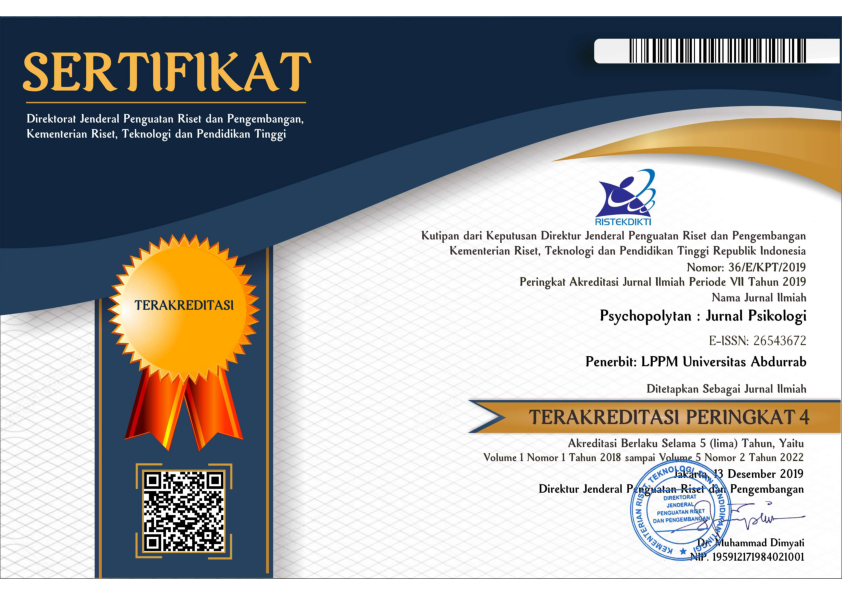Fear Of Missing Out ditinjau dari Big Five Personality
(Submitted 8 Juli 2020) (Published 28 Februari 2021)
Abstract
Media sosial membantu individu mendapatkan informasi yang diinginkan dan ini memberikan efek ketagihan. Efek ketagihan ini akan membuat penggunanya mengalami fear of missing out ditandai oleh individu dengan keingintahuan terhadap aktivitas dan atau terhubung dengan orang lain. Setiap individu dengan kepribadian memberikan dampak berbeda pula pada munculnya FoMO. Penelitian ini menggagas asumsi hubungan big five personality dengan FoMO. Partisipan penelitian berjumlah 204 orang diambil menggunakan quota sampling. Penelitian menggunakan skala big five inventory dan skala FoMO. Temuan penelitian mengungkap bahwa kepribadian agreeableness memiliki korelasi dengan FoMO (sig =0,015; p<0,05). Namun, tidak ada korelasi antara extraversion, neuroticism, conscientiousness maupun openness, terhadap FoMO pada masyarakat Pekanbaru.
References
Abel, J. P., Buff, C. L., & Burr, S. A. (2016). Social Media and the Fear of Missing Out: Scale Development and Assessment. Journal of Business & Economics Research (JBER), 14(1), 33–44. 10.19030/jber.v14i1.9554
Alt, D. (2015). College students’ academic motivation, media engagement and fear of missing out. Computers in Human Behavior, 49, 111–119. 10.1016/j.chb.2015.02.057
Alwisol. (2016). Psikologi Kepribadian. UMM Press.
Angesti, R., & Oriza, I. D. I. (2018). Peran Fear of Missing Out (Fomo) Sebagai Mediator Antara Kepribadian Dan Penggunaan Internet Bermasalah. Jurnal Muara Ilmu Sosial, Humaniora, Dan Seni, 2(2), 790. 10.24912/jmishumsen.v2i2.2317
Asosiasi Penyelenggara Jasa Internet Indonesia. (2018). Penetrasi dan Perilaku Pengguna Internet Indonesia. Apjii, Penetrasi dan Perilaku Pengguna Internet Indonesia, 1–34.
Ayutiani, D. N., & Putri, B. P. S. (2018). Penggunaan Akun Instagram sebagai Media Informasi Wisata Kuliner. 3(1), 39–59.
Besser, A., & Shackelford, T. K. (2007). Mediation of the effects of the big five personality dimensions on negative mood and confirmed affective expectations by perceived situational stress : A quasi-field study of vacationers. Personality and Individual Difference, 42, 1333–1346. 10.1016/j.paid.2006.10.011
Beyens, I., Frison, E., & Eggermont, S. (2016). “I don’t want to miss a thing”: Adolescents’ fear of missing out and its relationship to adolescents’ social needs, Facebook use, and Facebook related stress. Computers in Human Behavior, 64, 1–8. 10.1016/j.chb.2016.05.083
Błachnio, A., & Przepiórka, A. (2018). Facebook intrusion, fear of missing out, narcissism, and life satisfaction: A cross-sectional study. Psychiatry Research, 259, 514–519. 10.1016/j.psychres.2017.11.012
Blackwell, D., Leaman, C., Tramposch, R., Osborne, C., & Liss, M. (2017). Extraversion, neuroticism, attachment style and fear of missing out as predictors of social media use and addiction. Personality and Individual Differences, 116, 69–72. 10.1016/j.paid.2017.04.039
Daeng, I. T. M., Edmon, N. . M., & Kalesaran, E. R. (2017). Penggunaan Smartphone Dalam Menunjang Aktivitas Perkuliahan Oleh Mahasiswa Fispol Unsrat Manado. E-Journal Acta Diurna, VI(2), 1–15.
Elhai, J. D., Levine, J. C., Dvorak, R. D., & Hall, B. J. (2016). Fear of missing out, need for touch, anxiety and depression are related to problematic smartphone use. Computers in Human Behavior, 63, 509–516. 10.1016/j.chb.2016.05.079
Feist, J., & Feist, G. J. (2008). Theories Of Personality, Seventh Edition. In McGraw−Hill Primis. 10.1017/CBO9781107415324.004
John, O. P., Naumann, L. P., & Soto, C. J. (2008). Chapter 4 Paradigma Shift To The Integrative Big Five Trait Taxonomy.
John, O. P., Robins, R. W., & Pervin, L. A. (2008). Handbook of Personality Theory and Research. In The Guilford Press (Third). The Guilford Press. 10.2307/3005768
John, O. P., & Srivastava, S. (1999). The Big-Five Trait Taxonomy: History, Measurement, and Theoretical Persepectuve. 1–71. 10.1109/ICARM.2016.7606898
JWT. (2011). Fear Of Missing Out (FOMO). JWTIntelligence, May.
JWT. (2012). Fear Of Missing Out (FOMO). J. Walter Thompson Company, March.
Kurbalija, J. (2011). Sebuah Pengantar Tentang Tata Kelola Internet (Edisi Ke I). APJII-www.apijii.or.id.
Larasati, A., & Fitria, M. (2016). Kecenderungan Perilaku Cyberbullying Ditinjau dari Trait dalam Pendekatan Big-Five Personality pada Siswa Sekolah Menengah Atas Negeri di Kota Yogyakarta. Jurnal Psikologi Positif, 4, 161–182.
Lee, S., Tam, C. L., & Chie, Q. T. (2014). Mobile Phone Usage Preferences: The Contributing Factors of Personality, Social Anxiety and Loneliness. Social Indicators Research, 118(3), 1205–1228. 10.1007/s11205-013-0460-2
Lim, W., Phau, I., Cheah, I., & Teah, M. (2015). The Fear Of Missing Out. Global Fashion Management Conference at Florence, June, 152–158.
Listari, R. (2018). Peran fear of missing out (FoMO) dan kontrol diri terhadap kecenderungan adiksi media sosial pada remaja. In Electronic Theses & Dissertations (ETD). Universitas Gadjah Mada.
Marlina, R. D. (2017). Hubungan Antara Fear Of Missing Out (Fomo) Dengan Kecenderungan Kecanduan Internet Pada Emerging Adulthood. Naskah Publikasi, 1–12.
Marshall, T. C., Lefringhausen, K., & Ferenczi, N. (2015). The Big Five, self-esteem, and narcissism as predictors of the topics people write about in Facebook status updates. Personality and Individual Differences, 85, 35–40. 10.1016/j.paid.2015.04.039
Mastuti, E. (2005). Analisis Faktor Alat Ukur Kepribadian Big Five (Adaptasi dari IPIP) pada Mahasiswa Suku Jawa. INSAN, 7(3), 264–276.
McCrae, R. R., & Costa, P. T. (2006). Personality in adulthood A Five-Factor Theory Perspective. In Experimental Aging Research (Paperback, Vol. 12, Issue 1). The Guilford Press. 10.1080/03610738608259434
Pervin, L. A., Cervone, D., & John, O. P. (2010). Psikologi Kepribadian Teori dan Riset (Edisi Kese). Kencana.
Prasetyo, A., & Ariana, A. D. (2016). Hubungan antara The Big Five Personality dengan Nomophobia pada Wanita Dewasa Awal. Jurnal Psikologi Klinis Dan Kesehatan Mental, 5(01), 1–9.
Przybylski, A. K., Murayama, K., Dehaan, C. R., & Gladwell, V. (2013). Motivational, emotional, and behavioral correlates of fear of missing out. Computers in Human Behavior, 29(4), 1841–1848. 10.1016/j.chb.2013.02.014
Ramdhani, N. (2007). Apakah Kepribadian Menentukan Pemilihan Media Komunikasi? Metaanalisis Terhadap Hubungan Kepribadian Extraversion, Neuroticism, dan Openness to Experience dengan Penggunaan Email. Jurnal Psikologi, 34(2), 112–129.
Ramdhani, N. (2012). Adaptasi Bahasa dan Budaya Inventory Big Five. Jurnal Psikologi, 39(2), 189–207. 10.1016/S0143-4004(97)90091-6
Rosito, A. C. (2018). Eksplorasi Tipe Kepribadian Big Five Personality Traits Dan Pengaruhnya Terhadap Prestasi Akademik. Jurnal Psikologi Pendidikan Dan Konseling, 4(1), 6. https://doi.org/10.26858/jpkk.v4i1.3250
Solekhan, & Winarso, R. (2014). Pemanfaatan Media Sosial Sebagai Media Pemasaran Sangkar Burung di Kabupaten Kudus. Prosiding SNATIF, 445–448. 10.2298/PAN0903301G
Stead, H., & Bibby, P. A. (2017). Personality, fear of missing out and problematic internet use and their relationship to subjective well-being. Computers in Human Behavior, 76, 534–540. 10.1016/j.chb.2017.08.016
Tresnawati, F. R. (2016). Hubungan Antara the Big Five Personality Traits Dengan Fear of Missing Out About Social Media Pada Mahasiswa. Intuisi : Jurnal Psikologi Ilmiah, 8(3), 179–185.
Triani, C. I., & Ramdhani, N. (2017). Hubungan Kebutuhan Berelasi dan Fear of Missing Out dengan Harga Diri sebagai Variabel Moderator. Universitas Gadjah Mada.
Triastuti, E., Adrianto, D., & Nurul, A. (2017). Kajian Dampak Penggunaan Media Sosial Bagi Anak Dan Remaja. Pusat Kajian Komunikasi, FISIP Universitas Indonesia.
Copyright (c) 2021 Psychopolytan : Jurnal Psikologi

This work is licensed under a Creative Commons Attribution-NonCommercial-ShareAlike 4.0 International License.
1. Copyright of all journal manuscripts is held by the Psychopolytan : Jurnal Psikologi
2. Formal legal provisions to access digital articles of electronic journal are subject to the provision of the Creative Commons Attribution-ShareAlike license (CC BY-NC-SA), which means that Psychopolytan : Jurnal Psikologi is rightful to keep, transfer media/format, manage in the form of databases, maintain, and publish articles.
3. Published manuscripts both printed and electronic are open access for educational, research, and library purposes. Additionally, the editorial board is not responsible for any violations of copyright law.
licensed under a Creative Commons Attribution-ShareAlike 4.0 International License.
 pdf
pdf
 Abstract views: 2931
Abstract views: 2931
 downloads: 2665
downloads: 2665

 :
:








